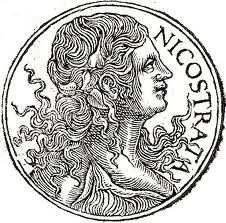As for Carmenta's origin, some believed that she came to Rome from Greece where she had been serving as a prophetess of Aracadia. These people believe that her name was initially Nicostrate and that she had a son named Evander who killed his father leaving himself and his mother with no option but to flee to Italy. Once in Latium, Nicostrate became known for her prophecies and was revered as a deity. The Italians renamed her "Carmenta" for the Latin word "Carmen" meaning "charm". Carmenta is credited with the invention of the Latin alphabet and supposedly altered 15 Greek letters to form it while Evander is known as one of the heroes in Rome's foundation.
To celebrate the holiday, Romans would bring offerings to Carmenta's sacred temple, located southeast of the Capitoline near a gate called the Porta Carmentalis. It was important to remember not to wear leather or any clothing made of animal skin into Carmenta's temple because it would be disrespectful to her emphasis on new life. Women brought milk, honey, cereal, grain and herbs to Carmenta's temple and would pray to her for fertility and an easy pregnancy. The women would speak to wise old members of Carmenta's cult, who would tell them of their unborn children's future.
Sources:
http://www.novaroma.org/nr/Carmentalia_(Nova_Roma)
http://hotelmule.com/wiki/Carmentalia
http://www.jofletcherbooks.com/2012/01/carmentalia/
http://www.ancientsites.com/aw/Article/1258623
http://www.thaliatook.com/OGOD/camenae.html

No comments:
Post a Comment